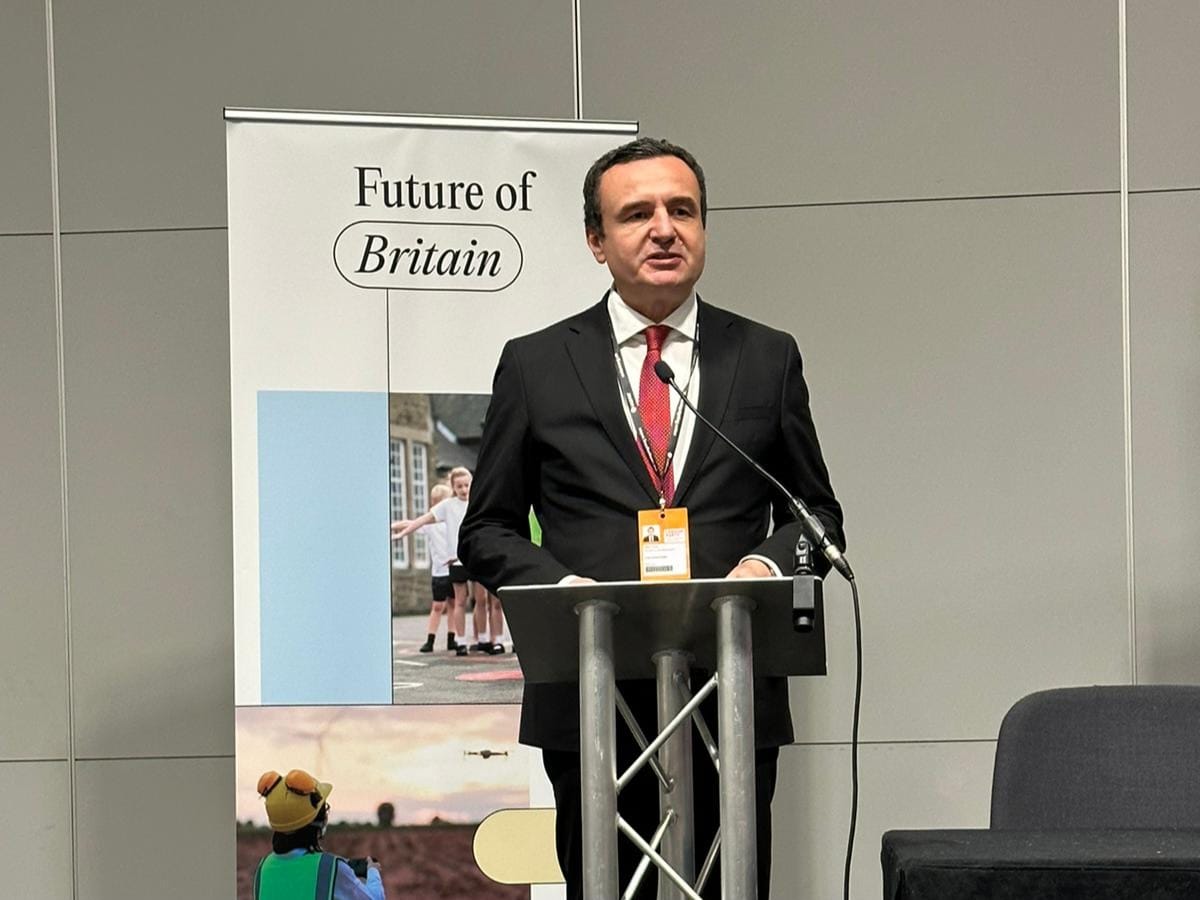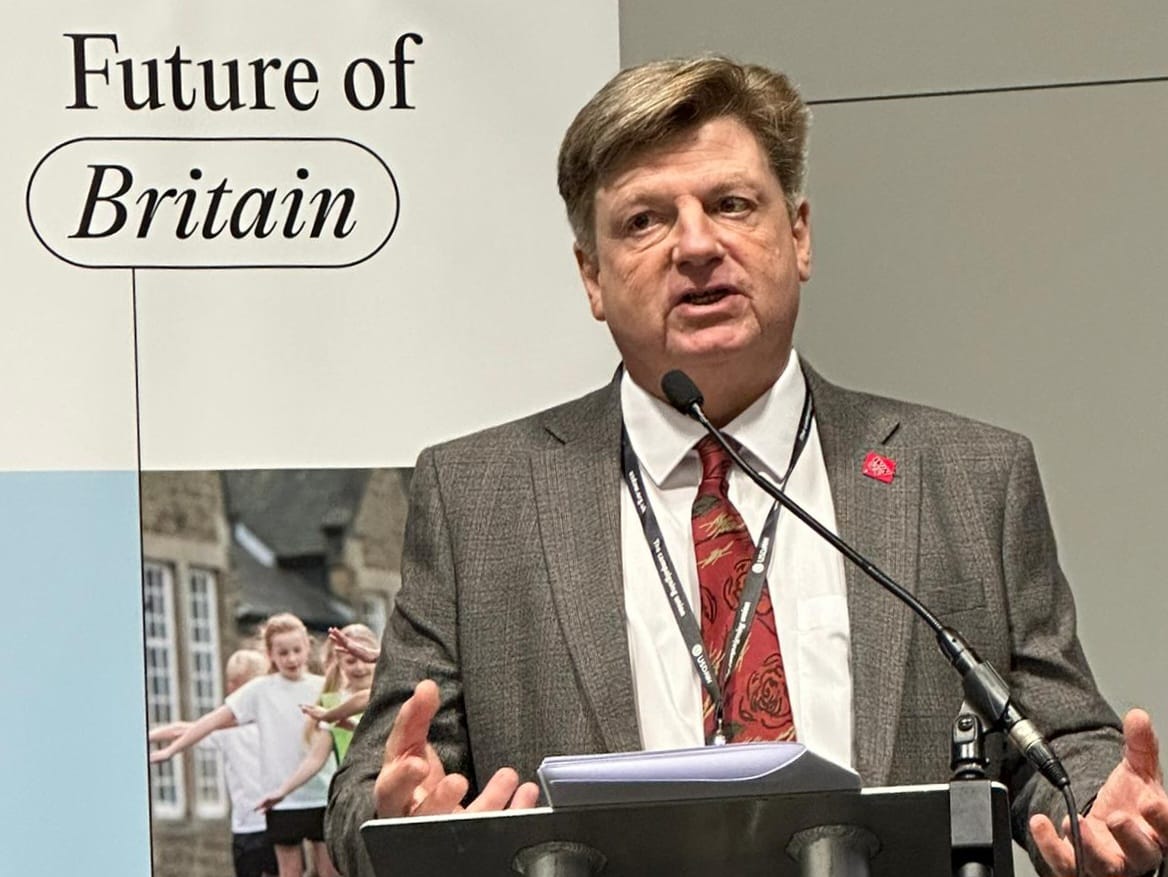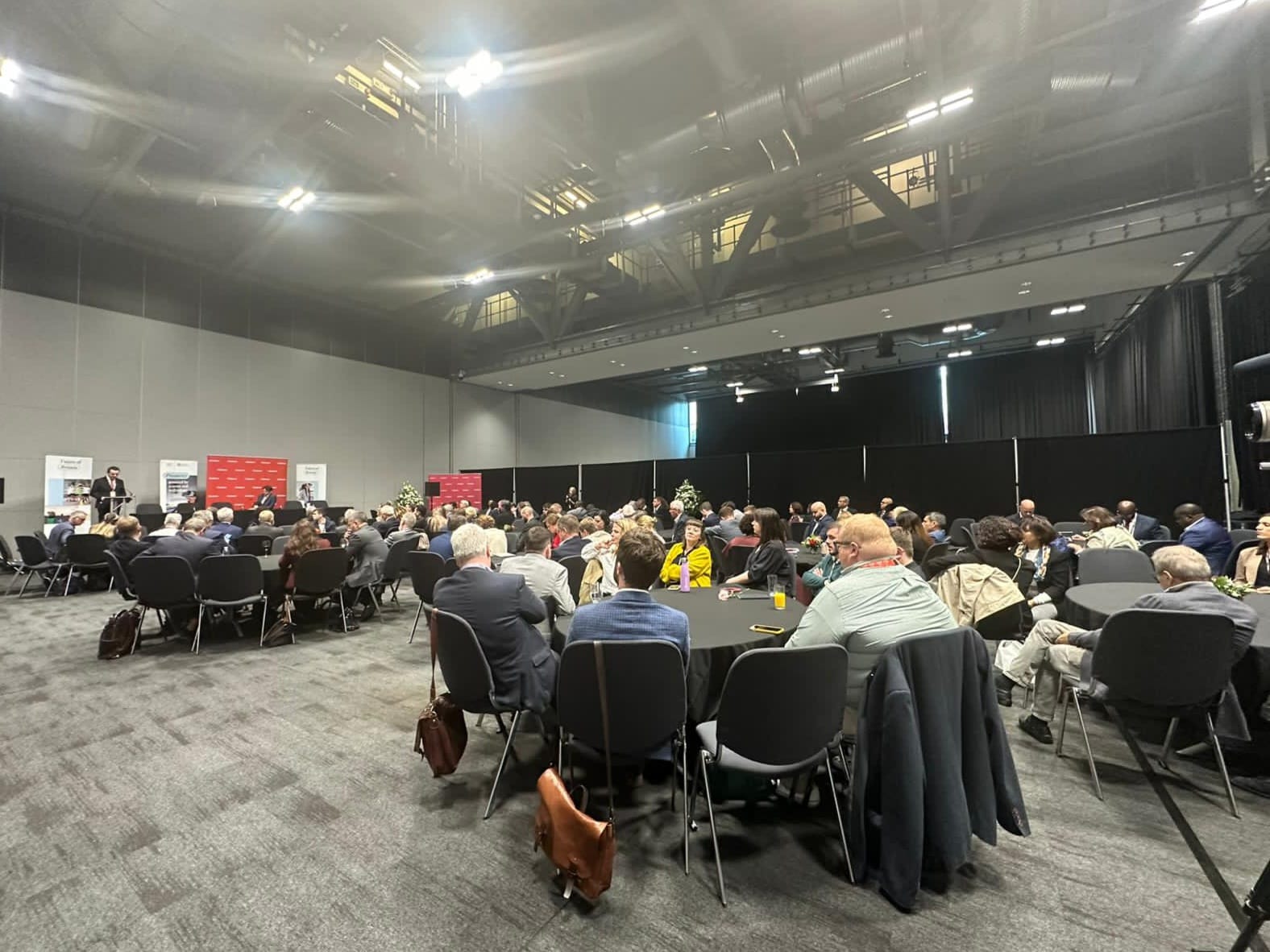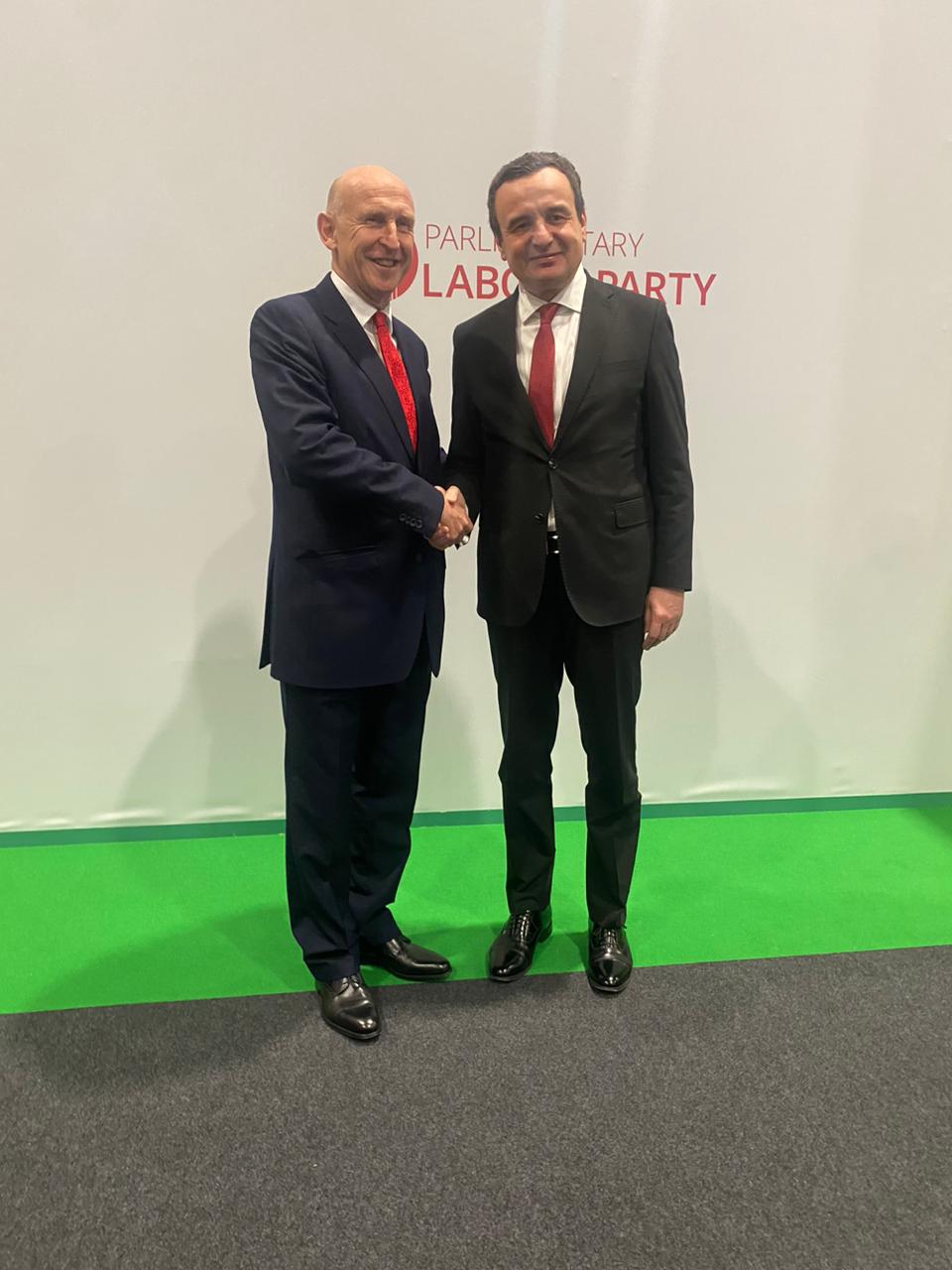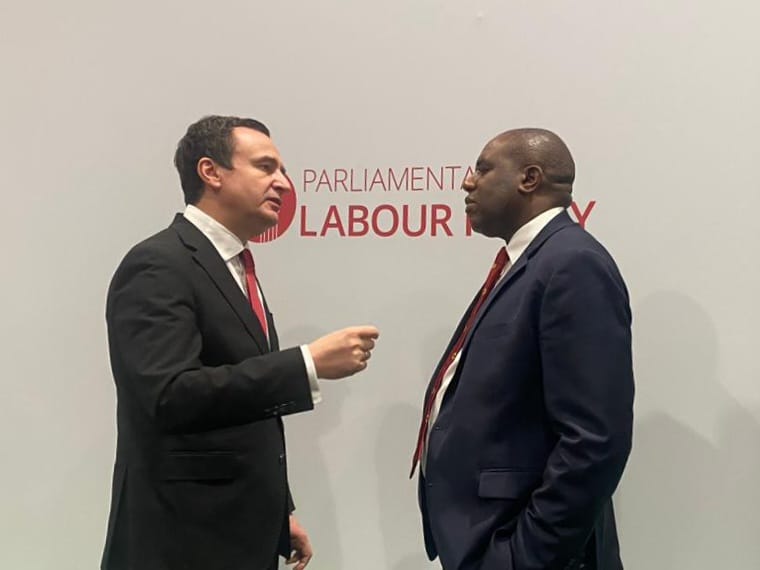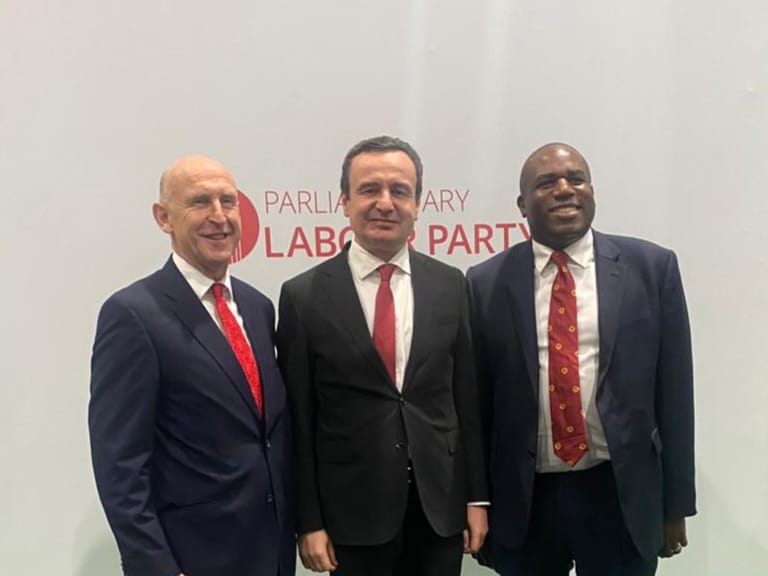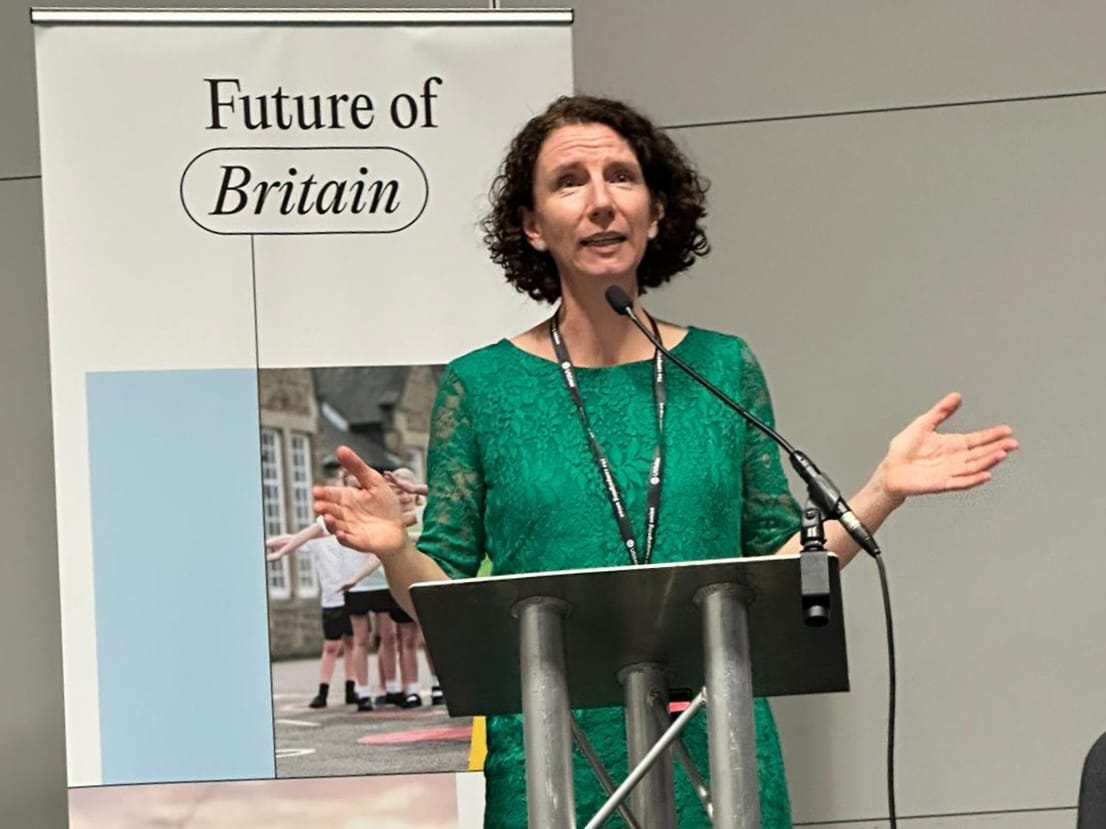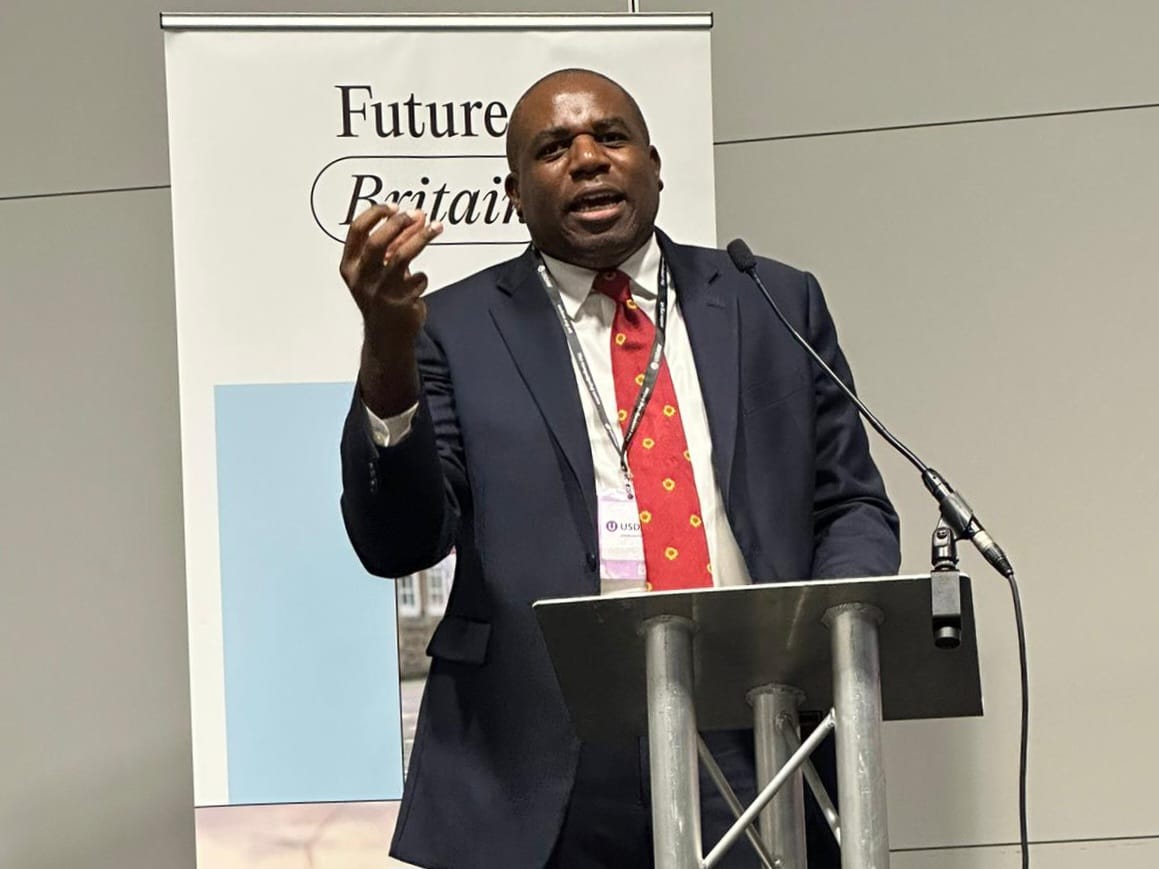Liverpool, 9 October 2023
Within the framework of the Labor Party Conference that is being held in Liverpool, the Prime Minister of the Republic of Kosovo, Albin Kurti, was invited as the main speaker at the lunch organized with the sister parties.
He expressed his honor for the opportunity to address the conference participants with a speech.
The influence of the Labor Party on the fate of Kosovo has been important and great, the Prime Minister declared at the beginning of the meeting.
Two of the most important moments in the recent history of Kosovo are the years 1999 and 2008, the liberation and independence respectively, during which the Labor Party was in power in the United Kingdom.
“In 1999, under the leadership of Tony Blair, the United Kingdom was part of the NATO military intervention to stop the continuation of the genocidal campaign by Serbian forces… then in February 2008, immediately after the declaration of independence, the United Kingdom, with Gordon Brown as prime minister, was one of the first countries to recognize Kosovo’s citizenship”, declared Prime Minister Kurti in his speech.
While revealing the successes of the Republic of Kosovo and the achievements of the government so far, Prime Minister Kurti emphasized that even though it is a state for a not very long time, Kosovo is proving that the intervention of NATO and a newly formed state can give life to a full democracy.
He spoke about the social-democratic governance in Kosovo, the reforms undertaken, the social, employment, energy and education policies, the government’s priority areas according to this year’s budget, the economic indicators and the democratic progress evidenced in international reports. Unfortunately, the momentum of achievements and progress is continuously being challenged by Serbia, he said.
Speaking about the terrorist and paramilitary attack of September 24, Prime Minister Kurti said that Serbia, as an ally of Russia, tried to copy the Donbas scenario in order to conquer the north. The increase in Serbian military presence on the border with the Republic of Kosovo was described as unprecedented by the White House’s National Security Council, while footage captured by drones in the terrorist group’s possession revealed that paramilitary troops were trained at official army bases. Serbian, thus irrefutably proving the direct involvement of the state of Serbia in planning the attack that was carried out two weeks ago in Banjska, on September 24.
However, the prime minister emphasized that the present and future of Kosovo, as well as the peace and security of Europe cannot be held hostage by Serbia, and that the perspective for peace, justice, and prosperity in a time full of challenges depends on what we choose to do, we do and how we choose to act together.
Before the start of the working lunch, Prime Minister Kurti took part in the hospitality organized for the international guests by the Shadow Secretary for Foreign Affairs of the United Kingdom, David Lammy and the General Secretary of the Labor Party, David Evans.
There he was warmly greeted and met by Shadow Foreign Secretary David Lammy and Shadow Defense Secretary John Healey. On those margins, he also met the General Executive Secretary of the European Party of Socialists (PES), Giacomo Fillibeck.
Meanwhile, last night, on his first day at the Annual Conference of the Labor Party of the United Kingdom, the Prime Minister of the Republic of Kosovo, Albin Kurti, gave a speech on the topic “Global challenges, collective solutions”.
In front of the attendees, among whom was the General Secretary of the Socialist International, Benedicta Lasi, the United Kingdom’s Shadow Secretary for Climate Change, Edward Miliband, MPs from Ukraine and representatives of the Social Democratic Party of South Africa, In his address to the African National Congress (ANC), Prime Minister Kurti singled out two global challenges of our time; Autocrats and the threat they pose to security and the climate crisis and its impact on the lives and well-being of people around the world.
Regarding the danger from autocrats, led by hegemonic and expansionist policies, he said that they do not recognize the neighboring states, and that they ask them either to become their puppets or to take part of their territory. Therefore, it is necessary to create global solidarity against autocrats and to protect democracy, and for this purpose, the prime minister singled out three social categories with a special role and potential and which make up the majority of society: workers, students and women.
Meanwhile, as far as the climate crisis is concerned, he said that Kosovo has recently experienced droughts, floods and fires more and more often than ever before. Being a reality and a common concern, Prime Minister Kurti called for us to come together in the implementation and respect of the Kyoto Protocol, the Paris Agreement and the Sofia Declaration, as he underlined that Kosovo is particularly engaged in increasing the capacities of renewable energy sources and energy efficiency.
Complete speech at the working lunch with the sister parties:
Honourable David Lammy, Shadow Secretary of State for Foreign and Commonwealth Affairs,
Honourable Annelise Dodds, Shadow Secretary of State for Woman and Equalities, Party Chair
Dear Chair Ryan Wain,
Dear panelists: Honourable Andrew Giles, Muthoni Wambu Kraal, Senator Humberto Costa, and member of German parliament, Jasmina Hostert,
Dear Sister Party guests and Labour Party Politicians,
Dear participants,
Ladies and Gentlemen,
I first would like to express my condolences and unwavering sympathy to those who have undergone tremendous loss and violence in the past 48 hours following the attacks in Israel.
It is an honor to be given the opportunity to address you today.
Your party’s influence on the fate of my country Kosova has been notable and impactful. Arguably, the two most important moments for Kosova were in 1999 and 2008, in our recent history, namely liberation and independence. During both of them, Labour was in power. In 1999, under Tony Blair’s leadership, the United Kingdom was part of NATO’s military intervention in Kosova, known as Operation Allied Force, stopping Serbian forces from carrying out the genocidal campaign and halting the unspeakable atrocities committed. The subsequent deployment of international peacekeeping forces, including British troops, helped stabilize the region and create conditions for the return of expelled Kosovars. The UK also welcomed many Kosovars who fled the war, and who have since become British citizens and are well integrated in your society. Our diaspora are hardworking individuals, with a progressive mindset, who contribute in both our countries. Then, in February of 2008, promptly after declaring independence, the UK, with Gordon Brown as Prime Minister, was one of the first countries to recognize Kosova’s statehood, affirming its right to exist and flourish into a democracy.
My connection to the Party goes a level deeper since my path to Prime Minister has been through forming and leading the social democratic party, Lëvizja VETËVENDOSJE!, 18 years ago. The journey from grassroot activism to sitting in office as Prime Minister, from politics as struggle to governance as service, has meant that the priorities at the heart of the political work – ensuring a dignified and socially protected life for our citizens so they can exercise their freedom – became magnified. And when these values are magnified, the country benefits. Almost three years ago, our campaign’s slogan was “Jobs & Justice”. People were joining, the Movement was growing. We became a self-aware majority. We said that we must become an ever larger majority, so that the previous parties in government won’t be needed for a coalition. And, we made it.
The recent success of Kosova shows that even though the country hasn’t been in existence for too long, it was proving that NATO intervention and a newly formed state can give birth to a full-fledged democracy.
Since taking office two and a half years ago, our government focused on two things: increasing the income of the country and redistributing it to all citizens, especially those who the system had ignored. Among other measures, this involved launching over 1000 police operations and 3800 arrests to curb corruption and crime, resulting in a 2/3rd increase in tax revenue without changing fiscal policy. Our fight against corruption brought a lot of hope and optimism among people, because they noticed that governance is just. And this optimism, this hopefulness, made them spend more, rather than save. Which is good for people’s lives and the country’s economy alike.
The annual state budget of 2023 was marked by significant increase in four fields: education, health care, agriculture and defense. At the same time, we launched forms of social support that didn’t exist before. For the first time in our country, we made it possible for all new mothers to receive government support, providing child allowances to 19% of our population.
Moreover, we made public education free at both the Bachelor and Master level and implemented initiatives like Science, Technology, Engineering and Maths (STEM) scholarships for women, who now account for over 50% of the STEM student body, compared to the EU’s average of 17%. We launched schools for vocational education and training by offering students qualifications in various trades suited for the demands of the labour market.
Our dedication extended to increasing the pension rate for people with disabilities by 33%. We launched a groundbreaking youth employment platform and ensured that those engaged in public art received the fair wages they had long deserved. The employment of the age group 18-24 (year olds), rose by 118%, and, in general, we’ve had an employment increase of approximately 14% in 28 months. What other governments might have considered a burden became the country’s engine.
The value of exports in 2022 doubled compared to 2020. As a result, the export-import ratio narrowed from almost 1 to 9, extreme trade deficit, in 2019 to less than 1 to 6 today. On average, each year of our governance, we generated more revenue for our economy than in the combined three previous years. It was economic growth driven by benefiting people rather than exploiting them.
In order to stimulate economic growth and improve the socio-economic wellbeing of our citizens, we have drafted a concept-document mapping out the establishment of a sovereign wealth fund that aims to regulate the investment of revenues from public assets. When social democrats get in power, the right wing expects you are not going to manage well. So it is of extreme importance to have an army of good managers in publicly owned enterprises, and we are bringing them under the common umbrella of sovereign wealth fund.
Although we have the world’s fifth-largest reserves of lignite, by the year 2030 we aspire to increase the share of renewables in our energy mix to an impressive 32%, a remarkable increase from our current level of around 10%. We fully adhere to Kyoto Protocol, Paris Agreement and Sofia Declaration.
In public administration, we reduced the difference between the highest and the lowest salary from 20:1 to only 4.78:1. The difference between my salary as Prime Minister and that of an ordinary soldier or a senior police officer is less than 3:1. The salaries of professors, doctors and prosecutors are approximately the same.
Our democratic progress was recognized by esteemed international organizations. According to today’s Freedom House report, Kosova is ranked 1st in the Western Balkans, 2nd in Europe, and 3rd globally for advancements in political rights and civil liberties. Reporters Without Borders also noted our substantial improvement, with a rise of 22 places in two years. Furthermore, Transparency International’s Corruption Index witnessed a significant climb of 20 places. So we insist on proving that economic development on one hand and democratic progres on the other go together. There are certain powers and superpowers in the world today that want to decouple democracy from development. And we are a relatively small country that is serving as a great example that it is possible to have an economic development which does not go at the expense of political pluralism, human rights or rule of law.
Democratic and economic progress are never small feats, but they are especially meaningful when the country is 15 years old and has faced its fair share of good governance trials. Unfortunately, the joy and momentum of our achievements are challenged by our northern neighbor.
As we move forward, we are reminded of our challenging past, not as a way to honor it but because the threats posed by our neighbor serve as a stark reminder of the terror we endured. Ever since the Kosova War was halted, Serbia continued to terrorize Kosova in different forms including using Russia’s veto at the Security Council against us and actively interfering with our accession to international organizations. These actions vividly display the vitriol of its intentions. Just two weeks ago, paramilitary groups entered Kosova, opening fire on our police and resulting in the tragic loss of one officer’s life.
Serbia, as a staunch ally of Putin, attempted to replicate the playbook of Donbas, with intentions to invade the north of Kosova. The military buildup around the border was described as “unprecedented” by the National Security Council in the White House, U.S. Seized footage revealed that the paramilitary troops had trained in official Serbian army bases, providing several pieces of irrefutable evidence that confirm the state’s direct involvement in the planning.
Kosova’s present and future cannot be held hostage by Serbia, and neither can peace and security for Europe. As we embark on the EU and NATO integration path and talks to normalize our relations with our northern neighbor, turning them into good neighborly ones, I ask that the Russian influence channeled through Serbia and the threat that it represents be taken seriously, so that the tyranny of those who hold public office to suppress and destabilize democracy in other countries can be stopped.
The prospect for peace, justice and prosperity in an era held high with difficult challenges, depends on what we choose to do and how we choose to act together.
Thank you, the United Kingdom. Thank you, Labour.
Last modified: October 10, 2023
